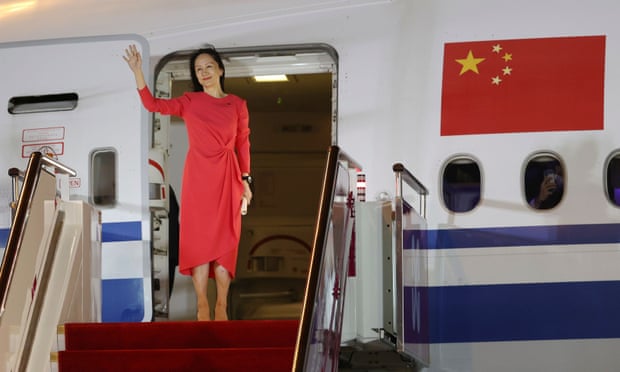
I, like almost all Chinese compatriots, am most delighted that Ms. MENG Wanzhou was able to come home from Canada where she had been under house arrest based on a U.S. extradition request since December 2018. It was a long ordeal for her—losing her freedom and missing her family for more than a thousand days!
Simultaneously, two Canadians, Mr. Michael Kovrig and Mr. Michael Spavor, who had been convicted for espionage in China, were released from prison and allowed to return to Canada. The Canadian Security Intelligence Service (CSIS), supposedly Canada’s spy agency, was among the first to publicly welcome them home. This per se does not prove that these two gentlemen were spies, but this possibility cannot be ruled out. After all, spying is the second oldest profession in the world, and no spy would voluntarily admit that he or she is a spy. However, every country, large and small, spies. Or so we have been told, by, for example, Julian Assange and Edward Snowden.
Was this then a hostage exchange, Ms. MENG for the two Michaels? Their almost simultaneous releases by the two counties suggest that this is very likely. There are many precedents for such exchanges. A well-known example is the exchange of Prof. QIAN Xuesen, a Chinese rocket scientist under house arrest in the U.S., for several captured U.S. pilots in China, in 1955. Such a hostage exchange makes sense for both Canada and China. I suspect Canada would have liked to be able to do so for quite some time.
The really intriguing question is: Why did it take so long to arrange this exchange? The answer is actually quite simple—the U.S., which had requested Canada to arrest and extradite Ms. MENG in the first place, would have been furious and Canada is in no position to offend the U.S., no matter how justified. What had occurred, after almost three years of litigation, was that the Canadian Court had begun to lean towards rejecting the US extradition request because of its failure to fulfill the standard common law double criminality requirement and/or the inadequacy of its proffered evidence. If the Canadian Court so ruled, strictly on legal grounds, Ms. MENG would be free immediately and it would have been a humiliating slap in the face for the U.S. But Canada can ill afford to offend the U.S., its much more powerful southern neighbor and largest export market. The non-prosecution agreement entered between Ms. MENG and the U.S. Department of Justice enabled the U.S. to withdraw its extradition request more gracefully and allowed the Canadian Court to release Ms. MENG without having to issue a final verdict one way or the other—it simply terminated the proceedings. It was a face-saver for the U. S. And Canada was also able to avoid having to offend either China or the U. S. or both and get its two citizens back at the same time. But no country really won—the relations among them were badly damaged by the MENG affair.
It would, however, be a mistake to consider the MENG affair to be an isolated incident. Ms. MENG was targeted only because it was thought to be an easy pressure point to get Huawei to surrender, since she is the daughter of Mr. REN Zhengfei, the CEO of Huawei. The ultimate U.S. goal is to either take over or destroy Huawei, a company that is considered a threat to U.S. national interests. It is how the U.S. military-industrial complex operates against its potential foreign competitors. The experience of the acquisition of Alstom, a French high-technology company, by a U.S. firm in 2015 is such an example. (This is described in the book, The American Trap, by Mr. Frederic Pierucci, a former senior executive of Alstom.) It would also be a mistake to attribute the MENG affair solely to Trumpian aberration, since the Alstom affair actually occurred during the Obama-Biden administration. One further worthwhile observation was that while many foreign banks and companies have been sanctioned and heavily fined by the U.S. Government, for example, BNP of France, Siemens of Germany, Toshiba of Japan, and HSBC of the U.K., it is extremely rare for the senior management of these sanctioned companies to be prosecuted as individuals, as in the MENG case.
A successful Huawei is a threat to U. S. technological dominance. Many real-time applications, such as remote surgeries and self-driving cars, require 5-G speeds, and Huawei currently owns the largest share of 5-G patents in the world. The U. S. military-industrial complex is intent on destroying Huawei by blocking its sales to markets in the U.S. and the Five Eyes Alliance and forbidding advanced semi-conductor manufacturers from supplying it. However, I believe Huawei, with its strong capacity for quality manufacturing and research and development, will be able to survive and prosper, based on not only its large domestic market but also potentially the markets in developing economies in Asia, Africa and Latin America and potentially continental Europe.

